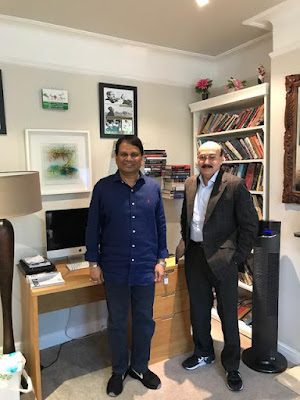Friday, June 28, 2019
Five key takeaways from Tarique Siddique’s “vendetta”
Republished from Bangladesh Politico
The story about what has happened to Colonel (rtd) Shahid Khan over the last fourteen months published on this blog (and previously by Al Jazeera) says a lot about contemporary Bangladesh – the impunity, the links between politics and business, the corruption of law enforcement, intelligence and other state bodies, the unlimited power of people around the prime minister Sheikh Hasina, the lies and false allegations – and how the victims simply just keep on piling up.
It is only because, unusually Khan lives with his family in the UK, and was in a position to provide information about the disappearances (which could then be independently corroborated) that these have now come out in the public domain.
It suggests that there are probably dozens – perhaps hundreds more – secret detentions and disappearances that are simply not recorded.
In August 2016, three sons of opposition leaders all of whom were convicted by the International Crimes Tribunal were picked up by law enforcement agencies. Reports suggest that these pick ups and subsequent secret detentions were authorised by Sheikh Hasina. One of the men has been released, also on Hasina’s authorisation.
Hasina had given authorisation for the pick-ups and continuing secret detentions after DGFI informed her that these three men were involved in a conspiracy against the government, including involvement in the Holey Artisan cafe militant attack, a month earlier. This was of course hocus-pocus – but Bangladesh governments, and intelligence agencies, are prone to believe conspiracy theories.
There was a time in Bangladesh, not so long ago actually, when people could count on the judiciary to act independently – that it would come boldly to the aid of those subject to abuse of power by state bodies. Those times are well and truly over.Almost no family, whose relative has been disappeared will entertain the possibility of approaching the High Court seeking its intervention. This is because they know the High Court will do nothing – they know the Judges will either be partisan in support of the governing party, and so would not do anything or, if they are of part of the ever diminishing category of remaining judges that are independent minded, they are too scared to take a position against the state’s law enforcement and intelligence agencies.
In the Khan case, no family members went to court over the secret detentions and disappearances. But there was one part of the overall harassment where a family member did go to court – over the blocking of Khan’s mother-in-law from leaving the country.
Legally, this is a black and white matter. The constitution provides the right of a citizen to leave the country. Immigration authorities at the airport can only block someone if there is an ongoing criminal case against them or the courts have ordered that person not to leave the country. In this case there was no court order and there is no ongoing criminal case.
This kind of blocking has happened before, and in earlier situation the High Court has been quick to pass an order allowing the person to leave the country. In this case, however the High Court did not do so. This failure is notable and provides further illustration of how the courts have lost their independence, and one can reasonable speculate that specific pressure was imposed on the judge in question not to pass the regular order.
The extent of harassment on Khan and his family is exceptional. Three of his employees have been picked up and disappeared; so have three of his brothers; his finance has been blocked; the travel of his family outside the country has been prohibited; his office and home have been raided; his lawyers have been stopped from working for him; and he and his wife have been accused of involvement in terrorist and money laundering.










